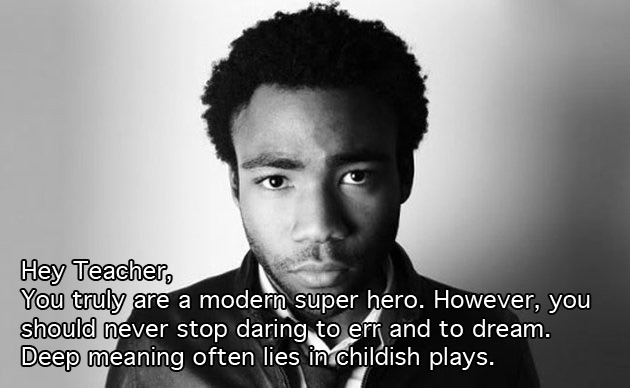"If you can't feed a hundred people, then feed just one." -Mother Teresa
I don't have all the answers. Or many at all, really. But I realized something: it's okay!
However, just because I may have no idea what I'm doing at times (at all the times), that doesn't mean I don't have to act, and stand up for what I believe in. Eloquent or not.
I am a very non-confrontational person. I care more than I'd like to admit about what others think of me. Which has maybe held me back in terms of what I'm capable of accomplishing. But I'm also passionate and believe strongly in the power of education, and the ultimate good of humanity. And in class it was encouraging, while discussing LGBT issues and tackling "that's so gay" comments, hearing that saying something, awkward as it may be, is better than nothing. Now that I've written it out, it seems obvious, but I think that too many people refrain from saying anything because they don't want to say something "wrong." If it's coming from your heart, and a conviction that equality is important, then your message will get across--and can promote change.
"Any reviewer who expresses rage and loathing for a novel is preposterous. He or she is like a person who has put on full armor and attached a hot fudge sundae." -Kurt Vonnegut
Last year my principal was super into Stephen Covey and brought his ideas of 7 habits of highly effective people into staff meetings. One idea that he brings up is spheres or circles of influence, and how effective people focus on what they have some degree of influence over. It's no use to stress out about what is in your "circle of concern" because you cannot do anything about it. I like this idea and I don't. I like it because I get overwhelmed by the big picture sometimes--the incredible existence of inequality in our education system, cycles of poverty, unjust laws etc. And it's good to take a step back and focus on something smaller. Something that I can do-teaching and making a difference just for my students. As they ask in my seminar class when we're all stressing out over everything we have to do: How do you eat an elephant? One bite at a time.
"Never doubt that a small group of thoughtful, committed citizens can change the world. Indeed, it is the only thing that ever has." -Margaret Mead
The reason that I don't like this idea is that I don't think people are good at knowing what their circle of influence is; they don't realize what they are truly capable of. Covey gives people an easy way to perhaps live a little more stress free, but to have a cop-out when the going gets tough. Now, I haven't done extensive reading of Covey, and he probably didn't intend that at all. But it's a concern.
Because that big scale change? Starts with one small act. Large-scale change occurs gradually. For equality to truly take hold in our society's values, it's going to take a generation or two. So the solution starts in education, starts when you can educate and empower all children. It starts when you can plant that seed of critical thinking, questioning the world you were born into, and being open to difference. So many horrors of violence-physical or psychological-done on the part of children stems from ignorance. It might not be better tomorrow--it's like planting a tree. You may not get to enjoy its shade, but does that mean you don't plant it? Of course not!
A little knowledge can go a long way. Kids are curious. And when their curiosity is shut down, they learn that these so-called difficult topics are taboo, and that difference becomes an unknown, something scary. But it doesn't have to be. Conversations about race, or gender identity or disabilities need to be had. So hey, I'm going to have them in my future classrooms. I don't have all the answers, and I probably will stumble through my discussions awkwardly.
The important thing is that I'm going to try. It goes beyond just believing in things. The thoughts in my head mean nothing without action--maybe ultimately this blog is useless because it's just my thoughts put into words on a page. I get encouraged when I see lots of stories in the media that use research, that shows us how education can and should be to be successful. But I also get discouraged, because while awareness is the first step, I haven't seen much change. We have the research, and we have a lot of people with good heads on their shoulders (who unfortunately are not always the ones in power). Why aren't we using it?
I'm hopeful, because when I go to classes, I'm surrounded by like-minded people who will for sure make a difference. And because I just discovered that one of my friends in a different credential program has also spent extensive amounts of time thinking about equality, beyond I'm sure what his coursework required of him. I have every confidence that he is going to make a world of difference. And luckily, he's not the only one.
 |
| The Lorax, Dr. Seuss |
So I guess it starts with me. And you.






